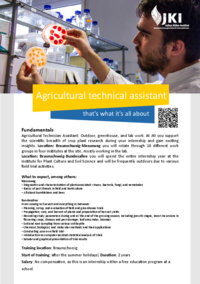Questions about the compact internship?
- Bundesallee -
Dr. Frank Höppner
Tel.: 0531-5962313
frank.hoeppner@julius-kuehn.de
- Messeweg -
Dr. Yvonne Becker
Tel.: 03946-47 6110
yvonne.becker@julius-kuehn.de
Inhalt: Agricultural technical assistant
Fundamentals
As an agricultural assistant, you will work outdoors as well as in greenhouses and laboratories. During your internship at the JKI, you will support the scientific spectrum of crop research and gain exciting insights.
- At the Braunschweig-Messeweg site, you will work in 10 different working groups in four different institutes at the site. Here, you will mainly be working in the laboratory.
- At the Braunschweig Bundesallee site, you will spend the entire internship year at the Institute of Plant Production and Soil Science and will frequently be outdoors due to a wide variety of field trial activities.
Training locations
- Braunschweig Bundesallee
- Institute for Crop and Soil Science
- Institute for Crop and Soil Science
- Braunschweig Messeweg
- Institute for Bee Protection
- Institute for Epidemiology and Pathogen Diagnostics
- Institute for Plant Protection in Field Crops and Grassland
- Institute for Plant Protection in Horticulture and Urban Green
What to expect
During your practical training, you will learn many exciting skills and gain valuable insights.
Our locations in Braunschweig have different areas of focus:
Bundesallee
From sowing to harvesting and everything in between
- Planning, setting up, and evaluating field and greenhouse experiments
- Growing, caring for, and harvesting plants, as well as processing the harvest
- Recording research parameters during and at the end of the growing season, including stages of development, insect visits to flowers, disease and pest infestation, leaf area index, biomass
- Soil and root sampling from different soil depths
- Application of chemical, biological, and molecular methods
- Conducting your own field trial
- Introduction to PC-based statistical evaluation of trials
- Tabular and graphical representation of trial results
Messeweg
Diagnosis and characterization of plant-associated viruses, bacteria, fungi, and nematodes
- Standard microbiological techniques, including sterile working practices, preparation of culture media, inoculation techniques, establishment of permanent cultures, enrichment and pure culture methods, e.g. extraction of nematodes from soil
- Microscopic (including electron microscopy) and DNA-based diagnosis, including sequencing and phylogenetic classification
- Molecular methods, including DNA and RNA extraction and gel electrophoresis, PCR, qPCR, Southern blot and hybridization
- Immunological working techniques
- Cultivation and care of test plants and greenhouse experiments
Basics about pests in field and horticulture
- Learning about beneficial organisms and pests
- Microbiological and entomological work
- Research into the biology and control of pests
- Learning about weeds and wild plants
- Planning, setting up, conducting, evaluating, and recording greenhouse and field trials, plant biotests with herbicides
Everything about bumblebees and bees
- Collaboration in the investigation of bee poisoning (Aedes test, pollen analysis, Nosema test)
- Laboratory and field experiments with wild bees, honey bees, and bumblebees, among others
- Population estimation
- Sampling from the colony
- Mortality records
- Flight assessments
- Preparation of honey sacs and pollen baskets
- Preparation and implementation of our own laboratory experiment with bumblebees
Pay
No remuneration, as this is an internship as part of free training at a school.
Vocational school, start and duration of training
After the summer holidays, you will begin your theoretical training at BBS III in Lüneburg.
The compact internship at the Julius Kühn Institute (JKI) in Braunschweig will begin after you have completed the six-month theoretical phase at school in early February. It will end after one year. The school-based training will end after two years with the final exams | Duration of training: 2 years


